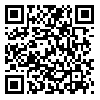Volume 6, Issue 4 (3-2019)
jmsthums 2019, 6(4): 33-46 |
Back to browse issues page
Download citation:
BibTeX | RIS | EndNote | Medlars | ProCite | Reference Manager | RefWorks
Send citation to:



BibTeX | RIS | EndNote | Medlars | ProCite | Reference Manager | RefWorks
Send citation to:
H K, E M, H M. Association between Health Literacy and Theory of Planned Behavior with Self-Care Behaviors in Type 2 Diabetic Patients. jmsthums 2019; 6 (4) :33-46
URL: http://jms.thums.ac.ir/article-1-537-en.html
URL: http://jms.thums.ac.ir/article-1-537-en.html
1- Qazvin University of Medical Sciences
Abstract: (7482 Views)
Background & Aim: Self-care in diabetic patients helps them to prevent complications of the disease and thus improves their quality of life. The aim of this study was to determine the relationship between health literacy, TPB constructs and self-care behaviors in diabetic patients in the city of Somesara.
Methods: This cross-sectional study was conducted from October to December in 2017. A total of 166 type 2 diabetic patients who referred to health centers in the city of Somesara participated using random sampling. The data gathering tools were demographic items, valid and reliable TPB construct’s scales, Health Literacy scale and Self-care scale. Data were analyzed by SPSS 23, Lisrel 8.8, Pearson correlation coefficient, and path analysis.
Results: The mean age of the samples was 57.3±9.5 years and 58.4% of patients were female. The mean health literacy scores in women was significantly higher than men (P=0.021). It was also higher in patients with higher educational level (P=0.026). The mean of attitude subjective norms, and intention showed a significant difference between patients with low and adequate health literacy (P<0.05). Moreover, the state of dietary intake (P=0.007) and physical activity (P=0.017) was different between patients with low and adequate health literacy. attitude (β=0.38), behavioral control (β=0.29), and norms (β=0.19) were significant strong predictors of behavioral intentions respectively )P<0.05).
Conclusion: The relationship between health literacy, attitude, subjective norms, and perceived behavioral control with self-care was significant in diabetic patients. Therefore, attention to these variables in the design of educational interventions seems necessary.
Methods: This cross-sectional study was conducted from October to December in 2017. A total of 166 type 2 diabetic patients who referred to health centers in the city of Somesara participated using random sampling. The data gathering tools were demographic items, valid and reliable TPB construct’s scales, Health Literacy scale and Self-care scale. Data were analyzed by SPSS 23, Lisrel 8.8, Pearson correlation coefficient, and path analysis.
Results: The mean age of the samples was 57.3±9.5 years and 58.4% of patients were female. The mean health literacy scores in women was significantly higher than men (P=0.021). It was also higher in patients with higher educational level (P=0.026). The mean of attitude subjective norms, and intention showed a significant difference between patients with low and adequate health literacy (P<0.05). Moreover, the state of dietary intake (P=0.007) and physical activity (P=0.017) was different between patients with low and adequate health literacy. attitude (β=0.38), behavioral control (β=0.29), and norms (β=0.19) were significant strong predictors of behavioral intentions respectively )P<0.05).
Conclusion: The relationship between health literacy, attitude, subjective norms, and perceived behavioral control with self-care was significant in diabetic patients. Therefore, attention to these variables in the design of educational interventions seems necessary.
Type of Study: Research |
Subject:
General
Received: 2018/11/3 | Accepted: 2019/01/26 | Published: 2019/05/28
Received: 2018/11/3 | Accepted: 2019/01/26 | Published: 2019/05/28
Send email to the article author
| Rights and permissions | |
 | This work is licensed under a Creative Commons Attribution-NonCommercial 4.0 International License. |





